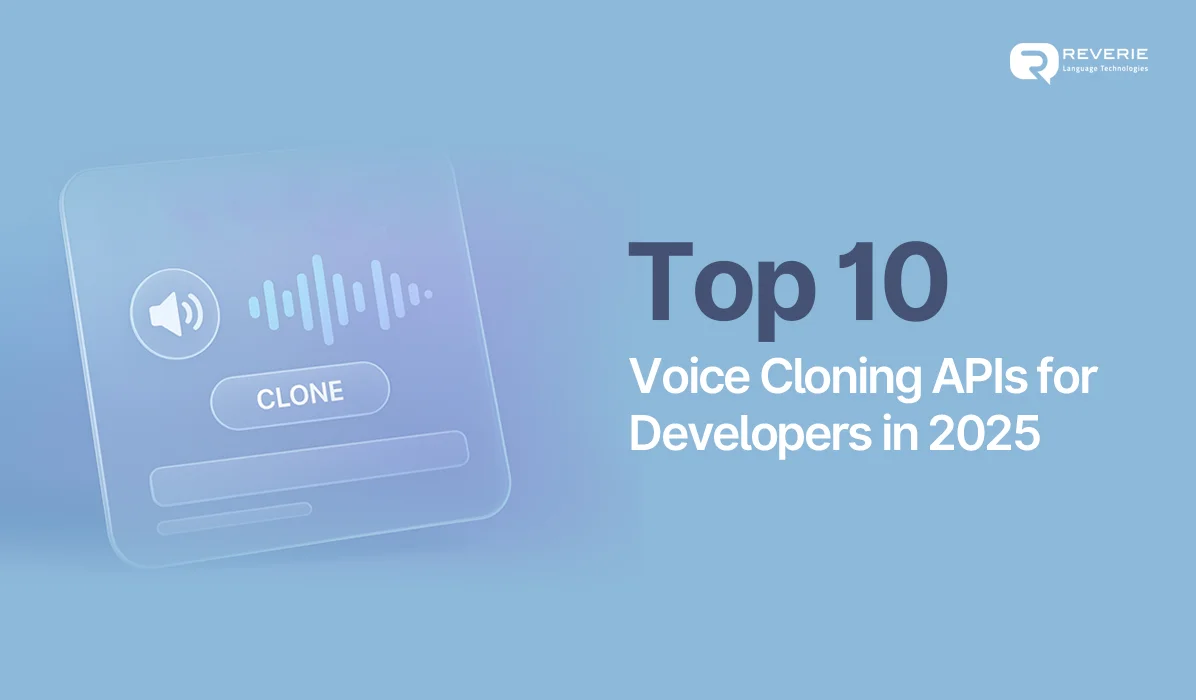In 2025, voice cloning has transcended novelty to become an essential AI voice cloning software, enabling applications that range from immersive games like NPCs and personalized marketing to accessibility platforms and virtual assistants. No longer an arduous, black-box process requiring months of data collection, modern AI voice cloning APIs deliver ultra-realistic, emotionally expressive, and multilingual voices with just minutes of training data.
Whether you’re building an IVR system that feels genuinely human, crafting an audiobook that resonates emotionally, or creating virtual characters for a blockbuster game, the choice of API can make the difference between an intangible hype feature and an ephemeral moment of genuine user delight. In this comprehensive guide, we analyze the Top 10 Voice Cloning APIs for Developers in 2025, that includes their features, pricing, use cases, and integration tips – so you can pick the perfect voice cloning API for your next project.
Why Voice Cloning Matters in 2025
- Enhanced User Engagement: Human voices convey nuance – tone, pace, emotion – that text alone cannot. An emotionally resonant voice can boost user trust, increase time on page, and drive conversions in e-commerce or ed-tech platforms.
- Accessibility & Inclusivity: Voice cloning democratizes content consumption: visually impaired users can hear lifelike narrations, non-native speakers benefit from localized accents, and aging populations value clear, natural voices.
- Cost & Time Savings: Traditional studio recordings involve scheduling talent, renting equipment, and multiple takes. AI voice cloning API-driven cloning reduces production timelines by weeks and slashes costs – especially for projects requiring dozens of voices across languages.
- Personalization at Scale: Marketing campaigns can address each customer by name, in a voice that mirrors their demographic profile. E-learning platforms can tailor tone and pace to a learner’s comprehension level in real time.
- Real-Time Interaction: Live voice bots and gaming NPCs can adapt speech on the fly, creating truly dynamic dialogues that respond to user input with minimal latency.
Top 10 Best AI Voice Cloning APIs for Developers
Perfect Pick: Reverie STT Voice Cloning API
“Multilingual, real-time voice cloning built for Bharat and beyond.”
Key Features |
|
Use Cases | BFSI & Retail voicebots, multilingual customer support, IVR personalization, e-learning platforms, regional content localization. |
Real-World Example | A major Indian bank uses Reverie STT to power its 24×7 multilingual voicebot, handling over 1Mn calls per day across Hindi, Tamil, and Bengali – reducing operational costs by 35% and enhancing customer satisfaction. |
Pricing | Custom pricing based on language, usage volume, and cloning features. Enterprise SLAs available. |
Why It’s the Best | Reverie STT combines real-time performance, regional language support, ethical voice cloning, and developer ease – all while being deeply aligned with multilingual markets and enterprise-grade reliability. It’s the most practical and scalable voice cloning API for high-volume, multilingual deployments. |
1. ElevenLabs
“Best-in-class realism with emotional nuance.”
Key Features |
|
Use Cases | Gaming NPCs, audiobook narration, marketing personalization |
Real-World Example | A leading gaming studio uses ElevenLabs voice cloning APIs to voice hundreds of side-quest characters. Dialogue dynamically shifts emotional tone based on in-game events, deepening player immersion |
Pricing | Free tier (10K chars/mo); paid from $5/mo |
Why It’s a Leader | ElevenLabs tops the list of best AI voice cloning thanks to its unmatched authenticity and fine-grained emotion tags. |
2. A2E.ai
“The developer-first playground for hyper-personalization.”
Key Features |
|
Use Cases | Fintech chatbots, personalized IVR, interactive storytelling |
Example | A fintech chatbot leverages A2E.ai to generate real-time, empathetic responses during sensitive loan discussions – mitigating user anxiety and boosting completion rates by 15%. |
Pricing | Custom, based on monthly usage |
Why It’s Unique | A2E.ai’s AI voice cloning software excels at hyper-personalization, making it a top pick for developer teams. |
3. Resemble AI
“Real-time synthesis meets emotional intelligence.”
Key Features |
|
Use Cases | Live streaming voice-over, virtual events, dynamic voice bots |
Pricing | $0.006 per second of audio |
Why You’ll Love It | For any project requiring instant, emotional TTS, Resemble AI is the go-to voice cloning API/ |
Developer Tip | In this affordable AI voice cloning software, leverage webhook callbacks to know exactly when your audio clip is ready – ideal for serverless architectures. |
4. Google Cloud Text-to-Speech
“Scalability and reliability at Google scale.”
Key Features |
|
Use Cases | IVR systems, global voice assistants, audiobook platforms. |
Case Study | A global hospitality brand powers its guest-assistant app with Google TTS. Guests receive voice-enabled concierge recommendations in their native tongue, boosting NPS scores by 10 points. |
Pricing | $0.000016 per character |
Why It’s Reliable | Backed by Google’s global edge network, this AI voice cloning software ensures sub-100ms responses and 99.9% uptime |
5. Microsoft Azure Cognitive Services Speech
“Enterprise-grade, hybrid cloud flexibility.”
Key Features |
|
Use Cases | Healthcare bots, enterprise call centers, in-vehicle assistants. |
Example | A multinational automaker embeds Azure TTS into vehicle infotainment. Drivers can choose from multiple “brand” voices for navigation prompts, creating an intangible sense of luxury. |
Pricing | $0.01 per 1,000 characters |
Why Enterprises Choose It | With enterprise SLAs, HIPAA/GDPR compliance, and edge modules, Azure leads for mission-critical applications. |
6. Amazon Polly
“Cost-effective, AWS-native synthesis.”
Key Features |
|
Use Cases | E-learning platforms, podcast automation, SaaS apps |
Pricing | Free tier: 5M chars/mo; then $4 per million |
Why It’s Scalable | Deep AWS integration via Lambda, S3, and Lex makes Amazon Polly the budget-friendly choice for high-volume needs. |
7. Play.ht
“Batch production meets creative simplicity.”
Key Features |
|
Use Cases | Marketing agencies, indie podcasters, e-commerce sites |
Pricing | Starts at $29/mo for 1M characters |
Why Creators Love It | Play.ht combines simple UI with powerful voice cloning API hooks—no coding required for basic workflows. |
8. Lovo.ai
“Where TTS meets multimedia creation.”
Key Features |
|
Use Cases | Video production, animated content, social media ads |
Pricing | From $25/mo |
Why It’s Innovative | Lovo bridges AI voice cloning software and video editing, slashing creative production cycles. |
9. Murf.ai
“Studio-quality production for corporate storytellers.”
Key Features |
|
Use Cases | Training modules, explainer videos, corporate webinars |
Pricing | Free trial; paid plans from $29/mo |
Why Businesses Choose It: | Murf delivers broadcast-ready audio and robust project management features. |
10. Speechify
“Fast-track clarity for learners and professionals.”
Key Features |
|
Use Cases | Language learning apps, productivity tools, audiobooks |
Pricing | From $139/year |
Why It’s Popular | Speechify’s mobile-first AI voice cloning software is a hit with students and busy professionals alike. |
How to Choose the Best AI Voice Cloning Solution
- Quality vs. Cost Trade-Off
- If voice realism is paramount in best AI voice cloning (e.g., audiobooks, gaming), consider ElevenLabs or Resemble AI.
- For large-scale, cost-sensitive deployme
- nts (e.g., IVR, automated announcements), Amazon Polly or Google TTS may be more economical.
- Emotional & Contextual Controls
- Need fine-grained emotional tagging? ElevenLabs leads.
- If contextual intonation based on preceding text matters, A2E.ai shines.
- Latency Requirements
- Real-time customer-facing bots demand sub-100ms response. Lean toward Resemble AI or cloud providers with edge nodes.
- Compliance & Security
- Healthcare, finance, or government projects require HIPAA/GDPR. Azure Cognitive Services or on-prem solutions are best.
- Developer Experience
- Comprehensive SDKs, code samples, and sandbox environments accelerate integration. A2E.ai, Google, and AWS provide the richest ecosystems.
- Scalability & SLAs
- Mission-critical apps (e.g., call centers) need guaranteed uptime and support. Opt for providers with enterprise SLAs like Microsoft, Google, or Amazon.
Emerging Trends & Future Outlook
- Ethical Consent Frameworks: Leading APIs now enforce explicit voice owner consent before cloning, preventing misuse and building user trust.
- Multimodal Voice-Video Synthesis: Expect turnkey integration with avatar generators (e.g., Tavus) so cloned voices sync automatically with animated faces – ideal for e-learning and marketing.
- On-Device TTS: Edge-optimized models let mobile and IoT devices generate speech offline, crucial for privacy-sensitive or low-connectivity scenarios.
- Adaptive Learning Voices: AI voices that learn from user corrections – adjusting pronunciation or style dynamically for continuous improvement.
- Ethical Consent Frameworks: Leading APIs now enforce explicit voice owner consent before cloning, preventing misuse and building user trust.
Conclusion
Choosing the right AI voice cloning software or voice cloning API can make the difference between a generic bot and an emotionally resonant companion. By carefully weighing quality, cost, latency, and compliance, you can select the API that best fits your project’s unique requirements. In 2025:
- For Emotional Realism → ElevenLabs, Resemble AI
- For Developer Freedom → A2E.ai, Google Cloud TTS
- For Enterprise Scale → Microsoft Azure, Amazon Polly
- For Creative Workflows → Play.ht, Lovo.ai
Invest in the best AI voice cloning platform that aligns with your technical requirements, budget constraints, and user-experience goals—and unlock the true power of humanized speech in your applications.
FAQ:
What is the difference between open-source and proprietary AI voice cloning software?
Open-source AI voice cloning software allows developers to modify and customize the code for tailored voice generation, while proprietary AI voice cloning tools like ElevenLabs, Murf.ai, and A2E.ai offer plug-and-play solutions with higher quality and support. If you’re building a commercial app, using a robust voice cloning API from a commercial provider is typically more scalable.
Can I use voice clone APIs for commercial applications?
Most voice clone APIs allow commercial use, but licensing and consent are crucial. Platforms like ElevenLabs and Microsoft Custom Neural Voice require verified user consent before cloning a voice. Always check the terms of service and ensure ethical, legal use in your projects.
Why choose the best AI voice cloning tools for development in 2025?
Choosing the best AI voice cloning platforms ensures better speech realism, multilingual capabilities, and low-latency APIs. These tools integrate seamlessly via a voice clone API or voice mimic software toolkit, empowering developers to build innovative apps for media, customer service, and accessibility.
Can voice mimic software generate multilingual synthetic voices?
Yes, modern voice mimic software supports over 100 languages and accents. Tools like Play.ht and Google Cloud TTS offer multilingual voice cloning API access, making them ideal for global businesses seeking to localize user experiences using AI voice cloning software.
What are the top criteria when choosing a voice clone API?
When choosing a voice clone API, look for emotional range, real-time synthesis, speaker identification, and ease of SDK integration. Leading AI voice cloning software providers also include detailed SSML support and custom training features for unique voice branding.
What programming languages support integration with a voice cloning API?
Most voice cloning APIs support RESTful integration and SDKs in Python, JavaScript, Node.js, and Go. Whether you’re using open-source tools or commercial AI voice cloning software, libraries and documentation make it easy to build cross-platform applications.
Is there free AI voice cloning software available for developers?
Yes, platforms like ElevenLabs, Resemble AI, and Lovo.ai offer free tiers or trials of their AI voice cloning software. These often come with limited character usage but include full access to voice clone API documentation, enabling developers to evaluate performance before scaling.
How does a voice cloning API ensure data privacy and security?
Trusted AI voice cloning software vendors use encrypted data transmission, access controls, and user consent validation. When using a voice cloning API, always check for GDPR, CCPA, or HIPAA compliance if you’re deploying it in regulated industries.
Can voice mimic software be used for real-time applications like gaming or streaming?
Absolutely. The most advanced voice mimic software offers ultra-low latency processing, making it perfect for real-time use cases like virtual avatars, Twitch streaming, or video games. These tools typically provide WebSocket or real-time voice cloning API endpoints.


